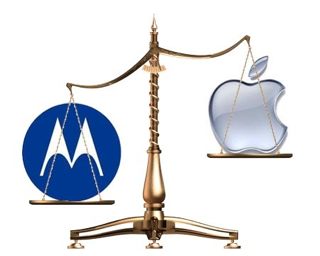Though it hinted it was tiring of patent wars and even dropped its ITC patent infringement claims against Apple (the move some deciphered as a gesture of goodwill), Motorola could be off the hook as Google was quoted as saying Monday that that a Wisconsin federal court tossed Apple’s “patent lawsuit with prejudice” out of the window.
The search monster relayed willingness of its subsidiary Motorola to license its patents portfolio at a reasonable and non-discriminatory rate “in line with industry standards”, court documents have it. Apple in a filing last week hinted it would accept a license at a court-determined rate of up to $1 per iPhone on FRAND terms. Also indicative, the two companies in August demonstrated ability to resolve differences, having signed a patent licensing agreement in Germany…
Reuters has the story:
A federal judge has thrown out a lawsuit by Apple Inc alleging that Google Inc-owned Motorola’s patent licensing practices were unfair, Google said on Monday.
A written statement from Google caught my attention (emphasis mine):
We’re pleased that the court has dismissed Apple’s lawsuit with prejudice. Motorola has long offered licensing to our extensive patent portfolio at a reasonable and non-discriminatory rate in line with industry standards. We remain interested in reaching an agreement with Apple.
The practice of leveraging standard-essential patents against rivals in litigation is a somewhat uncharted territory for most judges, but is nonetheless cause for concern, no matter which company is taking advantage of the system.
It was reported last month that Samsung could easily become the target of another antitrust investigation concerning suspected abuse of FRAND-pledged standard-essential patents, which the Galaxy maker asserted against Apple in litigation and recently used to sue its client over 4G wireless technology used in the iPhone 5.
The government created a legal and patent framework that allows this kind of abuse and therefore the government should take proactive measures and introduce legislative changes to fix what’s broken and enable level playing ground for everyone.
Everything else is secondary and really just a waste of taxpayers’ money, as far as I’m concerned.
What’s your view of FRAND licensing and the legal system that enables ambiguous interpretations of licensing deals?
